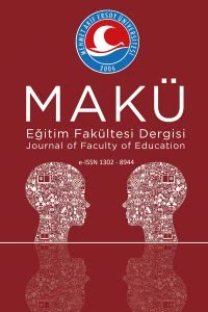THE EXPERIENCES OF ENGLISH LANGUAGE TEACHERS MAKING TRANSITION AMONG DIFFERENT EDUCATIONAL STAGES
Transition among educational stages, teaching English to different grades, English teacher appointment practices, Turkish educational stages
FARKLI EĞİTİM KADEMELERİ ARASINDA GEÇİŞ YAPAN İNGİLİZCE ÖĞRETMENLERİNİN DENEYİMLERİ
Eğitim kademeleri arasında geçiş, farklı sınıflara İngilizce öğretimi, İngilizce öğretmeni atama uygulamaları, Türk eğitim kademeleri,
___
- Arslan, R. Ş. (2012). Bridging the gap between policy and practice in teaching English to young learners: The Turkish context. Pamukkale Üniversitesi Eğitim Fakültesi Dergisi, 32(32), 95-100. Retrieved from http://pauegitimdergi.pau.edu.tr/Makaleler/626302087_tart%c2%a6-s%c2%a6%c4%9fma%202.pdf
- Baptiste, I. (2001, September). Qualitative data analysis: Common Phases, strategic differences. In Forum Qualitative Sozialforschung/Forum: Qualitative Social Research, 2(3), Art. 22. Retrieved from http://nbn-resolving.de/urn:nbn:de:0114-fqs0103226
- Broughton, G., Brumfit, C., Pincas, A., & Wilde, R. D. (2002). Teaching English as a foreign language. Routledge. Retrieved from http://prodibing.fkip.unsri.ac.id/userfiles/Teaching%20English%20as%20a%20Foreign%20Language%20(Routledge%20Education%20Books).pdf
- Cameron, L. (2003). Challenges for ELT from the expansion in teaching children. ELT Journal. 57 (2), 105-112. Retrieved from https://www.researchgate.net/publication/31130727_Challenges_for_ELT_from_the_Expansion_in_Teaching_Children
- Damar, E. A. (2004). A study on teaching English to young learners in EFL contexts. [Unpublished master’s thesis]. Uludag University. Retrieved from https://acikerisim.uludag.edu.tr/handle/11452/9566
- Dörnyei, Z., Csizér, K., & Németh, N. (2006). Motivation, language attitudes and globalisation: A Hungarian Perspective. Clevedon, Buffalo, Toronto: Multilingual Matters Ltd.
- Gürsoy, E., Korkmaz, S.Ç., & Damar, A. E. (2013). Foreign language teaching within 4+4+4 education system in Turkey: Language teachers’ voice. Egitim Arastirmalari-Eurasian Journal of Educational Research, 53/A, 59-74. Retrieved from https://www.researchgate.net/publication/290162270_Foreign_Language_Teaching_Within_444_Education_System_in_Turkey_Language_Teachers'_Voices/link/584ee8af08ae4bc899397d60/download
- Harper, C., & De Jong, E. (2004). Misconceptions about teaching English‐language learners. Journal of adolescent & adult literacy, 48(2), 152-162. Retrieved from http://www.schtools.com/membersnew/documents/MSSAA/14-15LLP-SEI_Harper_and_de_Jong_Misconceptions_about_Teaching_ELLs-1(1).pdf
- Kırkgöz, Y. (2007). English language teaching in Turkey: Policy changes and their implementations. RELC journal, 38(2), 216-228. Retrieved from https://www.researchgate.net/publication/249768829_English_Language_Teaching_in_Turkey_Policy_Changes_and_their_Implementations
- Kırkgöz, Y. (2008). Curriculum innovation in Turkish primary education. Asia-Pacific Journal of Teacher Education, 36(4), 309-322. Retrieved from https://www.tandfonline.com/doi/abs/10.1080/13598660802376204
- Kocaoluk, F., & Kocaoluk, M. Ş. (2001). İlköğretim okulu programı 1999-2000). İstanbul: Kocaoluk Publishers.
- Krusenvik, L. (2016). Using case studies as a scientific method: Advantages and disadvantages. [Unpublished paper]. Halmstad University. Retrieved from http://www.diva-portal.org/smash/get/diva2:1054643/FULLTEXT01.pdf
- Lesiak, K. (2015). Teaching English to adolescents. World Scientific News, 7, 246-260. Retrieved from http://www.worldscientificnews.com/wp-content/uploads/2012/11/WSN-1-2015-246-2601.pdf
- Loukotova, E. (2011). Young Learners and Teenagers–Analysis of Their Attitudes to English Language Learning [Unpublished doctoral dissertation]. Masarykova Univerzita, Pedagogická Fakulta. Retrieved from https://is.muni.cz/th/vmfsn/Loukotkova_Diploma_Thesis.pdf
- Miles, M. B., & Huberman, A. M. (1994). Qualitative Data Analysis: An Expanded Sourcebook (2nd ed.). Thousand Oaks, California: Sage.
- MoNE. (1997). İlköğretim okulu 4.ve 5. Sınıf yabancı dil öğretim programı. Milli Eğitim Bakanlığı Tebliğler Dergisi.
- Moon, J. (Winter, 2005). Teaching English to young learners: the challenges and the benefits. British Council, 30-34. Retrieved from https://ventana.fl.unc.edu.ar/files/Material-British-Council.pdf
- Onat-Stelma, Z. (2005). Moving from Teaching Older Learners to Young Learners: Cases of English Language Teachers in Turkey [Unpublished doctoral thesis]. University of Leeds. Retrieved from http://etheses.whiterose.ac.uk/11273/1/421985.pdf
- Psaltou-Joycey, A., Vrettou, A., & Penderi, E. (2017). L2 motivation of Greek young learners and adolescents. Selected papers on theoretical and applied linguistics, 22, 416-431. http://ejournals.lib.auth.gr/thal/article/view/6007/5761
- Schell, C. (1992). The Value of the Case Study as a Research Strategy. [Unpublished paper]. Manchester Business School. Retrieved from http://www.psyking.net/HTMLobj-3844/Value_of_Case_Study_as_a_Research_Strategy.pdf
- Taherdoost, H. (2016). Sampling methods in research methodology; how to choose a sampling technique for research. International Journal of Academic Research in Management (IJARM), 5(2), 18-27. Retrieved from https://papers.ssrn.com/sol3/papers.cfm?abstract_id=3205035
- Tragant, E. (2006). Language learning motivation and age. In C. Muñoz (Eds.), Age and the rate of foreign language learning. (pp.237-67). Clevedon: Multilingual Matters.
- Yin, R. K. (2009). Case study research: Design and methods (4th ed.). Thousand Oaks, CA: Sage.
- ISSN: 1302-8944
- Yayın Aralığı: 4
- Başlangıç: 2007
- Yayıncı: Mehmet Akif Ersoy
LİSE ÖĞRENCİLERİNİN TABLET BİLGİSAYARI KABUL DÜZEYLERİNİN ARAŞTIRILMASI
Mahmut Sami UZUN, Fuad BAKİOĞLU
4-6 YAŞ ÇOCUKLARIN ÖZ DÜZENLEME BECERİLERİ İLE ANNE TUTUMLARI ARASINDAKİ İLİŞKİNİN İNCELENMESİ
Kübra MADEN, Sıla UZKUL, Ayşe ÖĞRETİR
Merve Lütfiye ŞENTÜRK, Halil TURGUT, Seher BOYACI
THE EXPERIENCES OF ENGLISH LANGUAGE TEACHERS MAKING TRANSITION AMONG DIFFERENT EDUCATIONAL STAGES
MÜZİK ÖĞRETMENİ ADAYLARININ UZAKTAN EĞİTİM SÜRECİNDE ÖĞRETMENLİK UYGULAMASI DENEYİMİ
ÖĞRETMENLERİN DEĞERLER KAPSAMINDA İSTENMEYEN ÖĞRENCİ DAVRANIŞLARINA YÖNELİK GÖRÜŞLERİNİN İNCELENMESİ
Ali Rıza YAVRUTÜRK, Harun KAHVECİ
ERKEN ÇOCUKLUK EDEBİYATINDA PSİKOLOJİK SAĞLAMLIĞIN İNCELENMESİ
